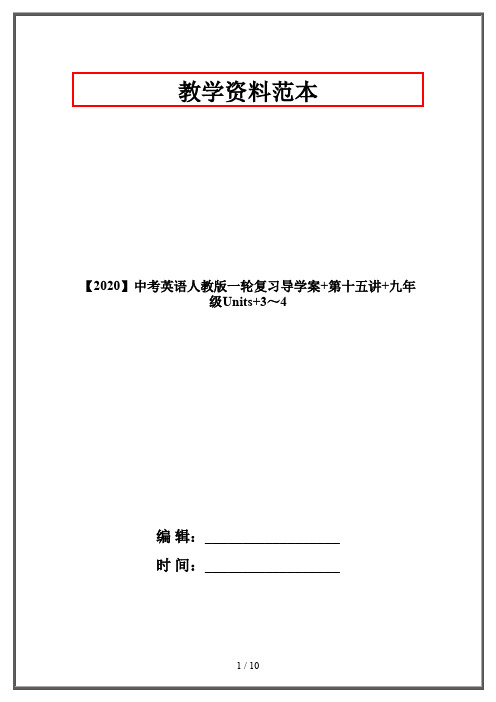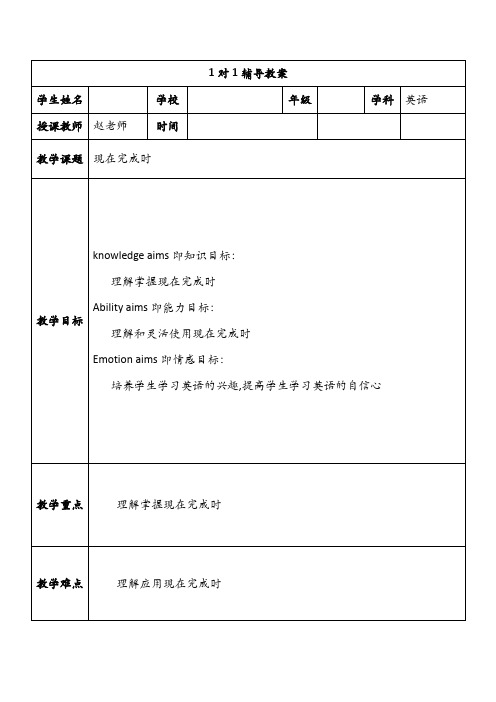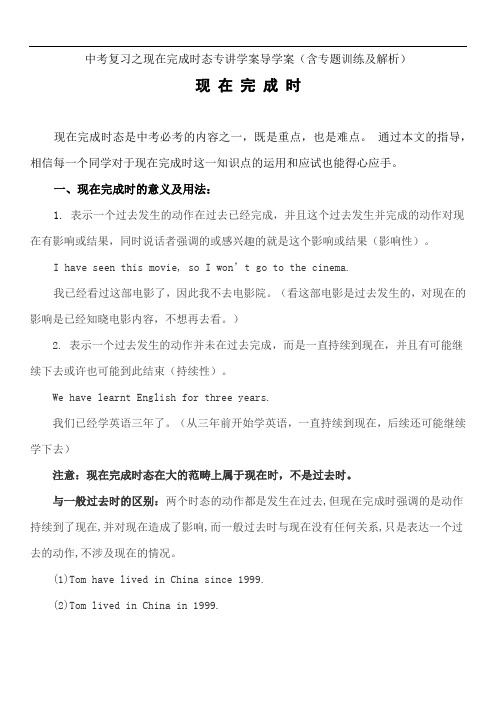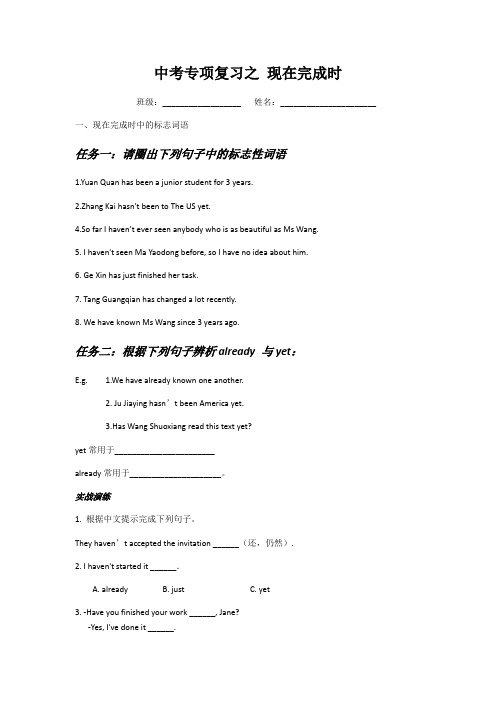2020年安徽省中考人教版英语现在完成时复习专题导学案设计
- 格式:docx
- 大小:20.48 KB
- 文档页数:6

【⼈教版】中考英语专题复习导学案:时态专题复习九年级英语专题复习时态专题导学案⼀、⼀般现在时⼀般现在时的⽤法:1.表经常发⽣的事情、存在的动作或状态,常⽤的频度副词有: always、often、 usually、seldom、never。
Eg. She often sings with the band Crazy Boy.2.表内⼼活动感情等eg. I don't think you are right.3.描述客观真理、⾃然现象、格⾔警句等eg. Birds fly in the sky.Pride goes before a fall. 骄者必败。
4.表计划或预定的⾏为但只限于start, begin, leave, go, come, arrive, return, take place 等。
eg The train leaves at 9:00 tomorrow morning.5. 表⽰现在的状态。
My father works in a factory. He is very busy.6. 表⽰主语具备的性格、特征和能⼒等。
Ann writes good English but does not speak well.具体情况(主要⽤于下⾯⼏情况)1) 描述当前时间内经常出现、反复发⽣的动作或存在的状态。
在这种情景中,句⼦常带有表⽰频率的时间状语:always , everyday , often , once a week (month , year , etc.) , sometimes , seldom , usually等等,以表⽰句中的动作或状态是习惯性的、经常性的。
例如:She doesn't often write to her family, only once a month. 她不常给家⾥写信,仅⼀⽉⼀封⽽已。
It seldom rains here .这⼉很少下⾬。



中考复习之现在完成时态专讲学案导学案(含专题训练及解析)现在完成时现在完成时态是中考必考的内容之一,既是重点,也是难点。
通过本文的指导,相信每一个同学对于现在完成时这一知识点的运用和应试也能得心应手。
一、现在完成时的意义及用法:1.表示一个过去发生的动作在过去已经完成,并且这个过去发生并完成的动作对现在有影响或结果,同时说话者强调的或感兴趣的就是这个影响或结果(影响性)。
I have seen this movie, so I won’t go to the cinema.我已经看过这部电影了,因此我不去电影院。
(看这部电影是过去发生的,对现在的影响是已经知晓电影内容,不想再去看。
)2. 表示一个过去发生的动作并未在过去完成,而是一直持续到现在,并且有可能继续下去或许也可能到此结束(持续性)。
We have learnt English for three years.我们已经学英语三年了。
(从三年前开始学英语,一直持续到现在,后续还可能继续学下去)注意:现在完成时态在大的范畴上属于现在时,不是过去时。
与一般过去时的区别:两个时态的动作都是发生在过去,但现在完成时强调的是动作持续到了现在,并对现在造成了影响,而一般过去时与现在没有任何关系,只是表达一个过去的动作,不涉及现在的情况。
(1)Tom have lived in China since 1999.(2)Tom lived in China in 1999.(1)句中强调Tom自从1999年就住在中国,从1999年一直到现在。
(2)句中强调T om在1999年住在中国,仅限于过去(1999年),现在情况如何无从知晓。
提醒:在平时的交际或作文中,能用现在完成时的,尽可能用现在完成时来表达。
二、现在完成时的结构主语 + have/has + 动词的过去分词三、常用搭配标志性时间状语:since + 过去时间点或一般过去时, so far, by + 现在时间非标志性时间状语:recently, for + 时间段常用副词:already, yet, still...四、现在完成时的考点1.当句中出现了过去的时间状语时,不能用现在完成时;同时,现在完成时也不能用when, what time提问。


中考专项复习之现在完成时班级:__________________ 姓名:______________________一、现在完成时中的标志词语任务一:请圈出下列句子中的标志性词语1.Yuan Quan has been a junior student for 3 years.2.Zhang Kai hasn't been to The US yet.4.So far I haven’t ever seen anybody who is as beautiful as Ms Wang.5. I haven't seen Ma Yaodong before, so I have no idea about him.6. Ge Xin has just finished her task.7. Tang Guangqian has changed a lot recently.8. We have known Ms Wang since 3 years ago.任务二:根据下列句子辨析already 与yet:E.g. 1.We have already known one another.2. Ju Jiaying hasn’t been America yet.3.Has Wang Shuoxiang read this text yet?yet常用于_______________________already常用于_____________________。
实战演练1. 根据中文提示完成下列句子。
They haven’t accepted the invitation ______(还,仍然).2. I haven't started it______.A. alreadyB. justC. yet3. -Have you finished your work ______, Jane?-Yes, I've done it ______.A. already; yetB. yet; yetC. yet, alreadyD. since, already任务三:根据下列句子辨析ever和neverI have ever read the story.Have you ever read the story?Zhang Xinpei has never had the chocolate.Class 5 have never been so close each otherever 作副词,意为“曾经”,常用于现在完成时的___________中,具体位于________________________________________。
人教版中考英语专题复习《时态专题复习》教学设计一. 教材分析人教版中考英语专题复习《时态专题复习》教材主要包括现在时、过去时、将来时和被动语态四大时态。
本节课旨在帮助学生系统地复习和掌握这四种时态的用法,提高他们的英语语法水平。
教材内容丰富,既有理论讲解,又有实例分析,还有练习题和测试题,旨在让学生在复习中不断提高。
二. 学情分析学生在小学和初中阶段已经学习了英语基础知识,对现在时、过去时、将来时和被动语态有一定的了解。
但部分学生对时态的掌握不够扎实,运用时态进行句子表达时仍存在一定的困难。
因此,在教学过程中,教师需要关注学生的个体差异,针对不同学生的学习需求进行有针对性的指导。
三. 教学目标1.知识目标:使学生掌握现在时、过去时、将来时和被动语态的构成、用法和辨析。
2.能力目标:提高学生运用时态进行句子表达的能力,增强他们的英语语法运用水平。
3.情感目标:激发学生学习英语的兴趣,培养他们积极向上的学习态度。
四. 教学重难点1.教学重点:现在时、过去时、将来时和被动语态的构成、用法和辨析。
2.教学难点:不同时态在实际语境中的运用和转换。
五. 教学方法采用任务型教学法、交际法和生活情境教学法,通过生动有趣的实例和实际语境,引导学生复习和巩固时态知识。
同时,运用小组合作、讨论和练习等方式,提高学生的参与度和积极性。
六. 教学准备1.教学课件:制作涵盖现在时、过去时、将来时和被动语态的教学课件。
2.教学素材:准备相关时态的例句、练习题和测试题。
3.教学设备:多媒体投影仪、音响设备等。
七. 教学过程1.导入(5分钟)利用多媒体展示不同时态的图片,引导学生猜测图片所表示的时态。
学生可以自由发言,教师总结并板书不同时态的关键词。
2.呈现(10分钟)教师通过PPT展示现在时、过去时、将来时和被动语态的构成、用法和辨析。
在呈现过程中,教师可以用简单的英语解释,同时配合中文翻译,以便学生更好地理解。
3.操练(15分钟)学生分组进行角色扮演,用所学的时态进行对话。
Grammar——现在完成时
一、现在完成时定义及结构
1.定义:过去对现在的影响,或过去的动作持续到现在
2.结构: have/has done
3.时间副词:already, yet ,ever, never ,in/during the past years,
so far , before等
4.任何动词均可用完成时,但是句中有时间介词for短语或since短语或since引导的从句时,句中完成时态的动词必须是延续性动词。
【例1】
He____ his homework yet, so he won’t go out with his classmates.
A. finishes
B. has finished
C. doesn’t finish
D. hasn’t finished(finish是终止性动词)
【例2】
Mr. White_____ math in this school since 2001
A. teaches
B. was teaching
C. has taught
D. taught(teach是延续性或终止性动词)
二、时间标志词
【例3】用for/since填空
He has lived in Nanjing___ the year before last.
I’ve known him ___we were children.
Our teacher has studied Japanese____ three years.
She has been away from the city ____about ten years.
It’s about ten years____ she left the city.
三、瞬间动词变延续性动词
【例4】
You______this story book for a month. You should return it to the library soon.
A. has had
B. have kept
C. have borrowed
D. have lent
【例5】
A lot of different shops ______since the Spring Festival.
A. have closed
B. have been close
C. are closed
D. have been closed
【例6】
Hurry up! The movie____ for 6 minutes. We can’t miss too much.
A. has been on
B. has started
C. started
D. begun
四、现在完成时& 一般过去时区别
I saw the film last week.
I have seen the film already.
一般过去时:强调过去,对现在无影响。
现在完成时:强调现在,对现在有影响
【例7】
—Where__ you___ the book?
—I____ it right here. But now it’s gone.
A. did; put; put
B. have; put; put
C. did; put; have put
D. have; put; have put
对比:---Where__you___ the map? I can’t see it anywhere.
---I _____it right here just now.
A. did; put; put
B. have; put; put
C. did; put; have put
D. have; put; have put
【例8】
—Haven’t you seen that film? That’s the funniest one I____ .—Really? When ___you____ it?
A. saw; have; seen
B. saw; did; see
C. have seen; did; see
D. have seen; have; seen
【例9】
— ___you____ the text yet?
—Yes, we____ it two hours ago.
A. Did; copy; did
B. Have; copied; have
C. Have; copied; did
D. Did; copy; had
五、have gone to & have been to & have been in区别
have gone to:离开未回
have been to:去已回
have been in:在某地
【例10】用have gone to & have been to & have been in填空1.—Where’s Jim?
—He____ Guilin.
2.She_____ the park, she will be back in two hours.
3.We_____ the bookshop and bought many books.
4.My father____ Beijing twice.
5.My parents____ Shandong for ten years.
时态精练
1.—What do you think of your junior high school life?
—It _____some sweet memories in my heart in the past three years.
A. leave
B. left
C. has left
D. will leave
2.—I will go to Guangdong for my summer holidays, mom.
—I will meet you when you ____the airport.
A.will reach
B. reaches
C. reached
D. reach
3.—What is Bill doing right now?
—He ____soccer. He ____soccer every Saturday.
A. play; plays
B. plays; is playing
C. is playing; plays
4.—Are you a basketball player in your school?
—Yes, I ____the team 3 years ago. I_____ in it for 3 years.
A. joined; was
B. was joined; am
C. have joined; have been
D. joined; have been
5.—Paris is a wonderful place.
—So it is. I____ there twice.
A. have been
B. have gone
C. went
D. will go
中考链接
1.—Where is Mr. Brown?
—He _____Australia. He _____there last year.
A. has been to; has been
B. has been to; has gone
C. has gone to; went
D. went; went
2.Before the sun____ , we will need to/ need get to the top of the mountain.
A. set
B. sets
C. is setting
D. will set
(主句为将来时的三种形式1will+v,2祈使句,3 情态动词+v)3.The professor reached Nanjing last Wednesday. He______ there
for 10 days.
A. has been
B. has got
C. has reached
D. has arrived
Extra Exercise
1.I _____Mr. Smith since he moved to Shanghai.
A. didn’t hear from
B. don’t hear from
C. won’t hear from
D. haven’t heard from
2.I_____ the book for two weeks. I must return it to the school library.
A. borrow
B. have borrowed
C. kept
D. have kept
3.He ____ Luzhou for three months.
A. has left
B. has come to
C. has gone to
D. has been away from
小结:做时态题一定要看时间状语。
做现在完成时题题干有for/since 时,句中完成时态的动词必须是延续性动词。